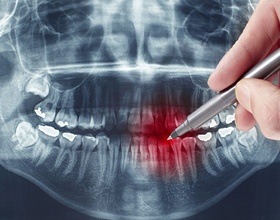Root Canal Therapy – Chesterfield, MO
Relieve Toothache Pain & Restore Your Smile
Root canal therapy is a common restorative procedure that you may need if you have severe tooth decay or a serious injury. This procedure can rescue a tooth from extraction and keep your smile intact -- keep reading to find out just what to expect from root canal therapy in Chesterfield, MO.
How Do I Know if I Need a Root Canal?
 A root canal is necessary when the tissue that lives in the interior of the tooth is infected or has been damaged. Because this is where the nerves of the tooth are housed, you are likely to experience moderate to severe pain as well. A persistent ache is one of the most common symptoms of a tooth that requires root canal therapy.
A root canal is necessary when the tissue that lives in the interior of the tooth is infected or has been damaged. Because this is where the nerves of the tooth are housed, you are likely to experience moderate to severe pain as well. A persistent ache is one of the most common symptoms of a tooth that requires root canal therapy.
Some of the other tell-tale symptoms of a tooth that needs a root canal include:
- Discoloration of the tooth
- A pimple-like bump on the gums below the tooth
- Sensitivity
- Gum recession
- A foul odor emanating from the tooth
How Does Root Canal Therapy Work?
 A root canal is a procedure that usually takes place over the course of two visits to the dentist’s office. During the first, the interior of the tooth is cleaned out and a biocompatible material takes its place. Then, the infection is allowed to heal and your permanent restoration is created in a separate laboratory. You return to our dental office for its final placement one to two weeks later.
A root canal is a procedure that usually takes place over the course of two visits to the dentist’s office. During the first, the interior of the tooth is cleaned out and a biocompatible material takes its place. Then, the infection is allowed to heal and your permanent restoration is created in a separate laboratory. You return to our dental office for its final placement one to two weeks later.
Root canal therapy may have the reputation of being painful, but thanks to modern anesthesia and sedation options, there is nothing to dread from this procedure. We will only begin once we are sure you are completely comfortable.
What Happens After a Root Canal?
 Once the procedure is complete, we will give you plenty of time to relax until you are ready to go home. We will send you off with post-operative instructions including what to eat, how to care for the tooth, and other important information.
Once the procedure is complete, we will give you plenty of time to relax until you are ready to go home. We will send you off with post-operative instructions including what to eat, how to care for the tooth, and other important information.
To enjoy a speedy and comfortable recovery, make sure you…
- Maintain a soft diet in the first day or two after your procedure
- Take all pain medication exactly as directed
- Use an ice pack to minimize swelling
- Brush and floss your teeth the same day, but be careful to avoid the treatment area
- Notify our dental office if your symptoms do not improve after several days
Learn More Today!
Do you have more questions about root canal therapy? We’re here to answer them. Go ahead and get in touch with your dentist in Chesterfield today!
Understanding the Cost of Root Canals

Root canal treatment is incredibly effective for preserving decayed or damaged pearly whites, and you can be sure to make the most of your smile once your procedure is done. However, you’ll want to know how much you’ll need to pay before moving forward. During your initial consultation, our team will go over your oral health and provide a more precise price estimate so you know what to expect. Until then, here are several things to keep in mind.
Factors That Can Affect Root Canal Cost

The cost of your root canal treatment will vary depending on certain factors, which can be different from patient to patient. The most common things that can influence the overall price include:
- The location of the tooth: Teeth at the back of the mouth will cost more to treat with a root canal compared to front teeth, as molars have more roots to work with.
- The complexity of the case: More extensive or challenging root canals may require the help of outside specialists, which can end up raising the price of your treatment.
- Additional dental services: If any other services are needed after your root canal, such as a dental crown, then this can impact the overall value of your procedure.
Is it Cheaper to Extract My Tooth?

This might seem like a more convenient and cost-effective method for getting rid of a problematic tooth at first. However, you’ll want to remember the long-term price of removing a tooth. Missing even a single tooth can lead to various oral health complications, such as dental shifting and jawbone deterioration. To prevent this, you’ll need to pay for a tooth replacement, such as a dental implant, to preserve your smile, which might cost much more than it would with a simple root canal. Instead, you can save both money and time by simply opting for the latter at the start.
Does Dental Insurance Cover Root Canal Treatment?

Since this treatment is considered an essential dental procedure, root canals are often covered by dental insurance—typically around 50% to 80% of the total after you’ve met the deductible. Even so, don’t forget that each plan is unique to each patient, so you’ll want to verify the details of your benefits with your company before assuming what’s covered. Our team would be happy to help you with this process if necessary, that way you can enjoy a smoother experience.
Other Options for Making Root Canal Treatment Affordable

For those who aren’t currently insured, our team doesn’t want you to feel like you’d be left behind. That’s why, to help make your root canal treatment more manageable, we’re happy to offer plans through our Smile Advantage Program for dental savings as well as monthly financing with CareCredit. With either option, you’ll be able to save more in the long run while being able to fix and improve your smile.
Root Canal FAQs

Reading through the above sections can give you important insight into the procedure and what happens afterward, but what if you still have some lingering questions about root canal treatment? Well, you have a few options! If you’d like to speak to our Chesterfield emergency dentist directly about this tooth-saving treatment, you can always give us a call to schedule an appointment. If you’re not quite ready for that yet, that’s okay – we’ve answered FAQs on the topic below too.
Why Do I Need a Root Canal if My Tooth Doesn’t Hurt?
If you aren’t feeling any pain because the infection has “killed” the nerve, then root canal treatment is arguably more important than ever! It’s also important that we mention that pain isn’t the only symptom of a severely damaged tooth. Other warning signs include bleeding gums, dark discoloration on one or more of your teeth, and a pimple-like bump or blister on your gums. In short, if you’re ever unsure, you can always reach out to us. We’ll conduct an exam, share our findings, and explain why we recommend root canal treatment.
How Much Pain is Normal After a Root Canal?
Although you won’t feel any discomfort during the root canal procedure, you may feel some soreness during the recovery period. This is completely normal, and this sensation should subside around the three-day mark. If it doesn’t, then let us know. That way, we can learn more about your symptoms and, if necessary, have you come back to our office for an exam.
What Happens if You Wait Too Long for a Root Canal?
Unfortunately, there are several unpleasant consequences of waiting too long to get a root canal. For example, if the infection isn’t treated, it can spread to your surrounding teeth and gums before moving to the rest of your body, including your vital organs. It’s also important that we mention that there will come a point where saving your tooth is no longer an option! If that happens, then we’ll need to extract your tooth and administer any other necessary restorative care before filling the open space with a dental bridge, denture, or dental implant.
Can Root Canals Be Prevented?
The good news is that prioritizing your oral health can drastically reduce your chances of needing a root canal. So, if you haven’t already, there’s no time like the present to implement a solid dental care regimen! That starts with brushing and flossing consistently and extends to other best practices, like wearing a mouthguard when playing sports, visiting us twice a year for a checkup and cleaning, and not smoking. Together, habits like these will help keep your teeth and gums healthy and infection-free.
Can I Take Antibiotics Instead of Getting a Root Canal?
No, antibiotics are not a replacement for root canal treatment. If you’re interested in learning more about the benefits of this tooth-saving service as well as the other treatment options available to you, don’t hesitate to reach out to us – we’re here to help!

